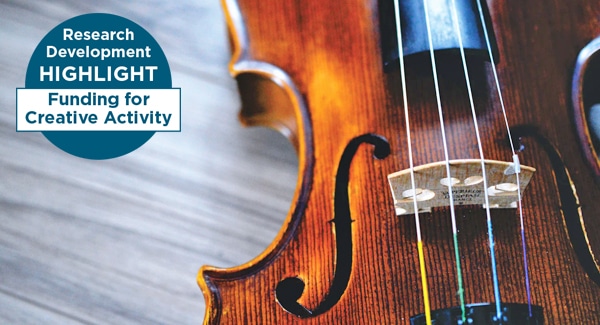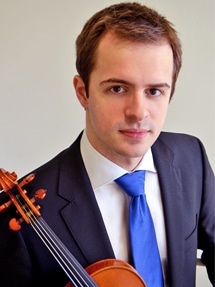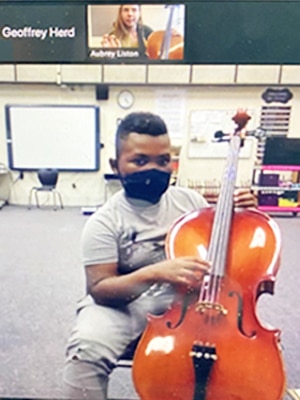 Geoffrey Herd’s passion for the violin is infectious. His enthusiasm has attracted students from China, Thailand, and throughout the United States to study at the University of Tennessee. But now he is sharing his love of string instruments a little closer to home.
Geoffrey Herd’s passion for the violin is infectious. His enthusiasm has attracted students from China, Thailand, and throughout the United States to study at the University of Tennessee. But now he is sharing his love of string instruments a little closer to home.

Geoffrey Herd, UT School of Music
Herd, a full-time lecturer in UT’s School of Music, recently obtained a $3,500 grant from the Tennessee Arts Commission’s Arts Building Communities program to inspire Knoxville’s inner-city youth to take up string instruments.
The String Project provides instruments and private lessons for students in select Knox County schools. Last August, the pilot program was open to Sarah Moore Greene Magnet Academy students in grades 3–5 who participate in the YMCA after-school program.
“Our goal is to bring low-cost music lessons to the children and student teaching experiences to our graduate students,” Herd explained. “There is a huge gap today in young students’ participation in string education.”
Six children—five violin students and one cello student—enrolled in the program. Their music teacher, Kirstine Andersen, a vocal music education graduate from UT’s School of Music. She said the students’ have three key obligations: they must be committed to following through with the program, bringing their instruments to school, attending the after-school classes.

Student taking a virtual cello lesson with Aubrey Liston
Students take weekly lessons with School of Music graduate students, Karen Christie, Varissara Tanakom, and Aubrey Liston create worksheets, practice charts, and other activities for the students to work on between their weekly lessons. So far, the focus has been on teaching fundamentals, Andersen said, but will later shift to repertoire. They’re already making plans for a concert in the spring when the students can safely perform with their teachers.
“On a classroom level, I’m seeing these kids engage more,” said Andersen. “They have new knowledge they like to share—such as rhythm—and like to show their instruments to their classmates. Their confidence is growing and they’re becoming leaders in the classroom.”
Andersen explained that, although the students didn’t initially understand how difficult it can be to learn an instrument, they are showing tremendous progress. “They can now hear something and play it back by ear. You can see that they’re practicing,” she said. “They keep up with their practice charts, and the younger students, especially, like coloring in those boxes. In one case, that means 500 bow holds, which is tremendous. It shows their commitment.”
While the original plan for in-person instruction was waylaid by the pandemic, he looks forward to bringing the program to other schools soon. Herd notes that it can cost upward of $50 per hour for private lessons, so funding will be crucial. That’s where Hannah Schmidt, research development coordinator in UT’s Office of Research and Engagement (ORE), comes in.
Schmidt, who earned a master’s degree in art history from the University of St Andrews in Scotland, particularly enjoys working with research in the arts. In her role at ORE, she coordinates the Creative Residencies, Awards, Fellowships, and Trainings (CRAFT) Program, which serves faculty in the arts, in addition to coordinating the office’s limited submissions competitions.
“When Hannah came to ORE, there was great excitement at the School of Music. Finding and submitting proposals through the UT System was all new to us.” Herd explained. “She attended our faculty meeting, taught us how to set up Pivot accounts, and has been a valuable resource to the School of Music. There are a lot more applications going out, and a lot more money coming in.”
Herd’s grant from the Tennessee Arts Commission was a limited submission opportunity, restricting the number of applications to one per institution. Herd’s application was successful due in part to Schmidt’s feedback after prior limited submission competitions. She later made edits and provided valuable suggestions for the final proposal.
“Hannah is so proactive,” Herd said. “If you haven’t met her, I encourage you to introduce yourself to her and talk about your goals. She’ll take the initiative and look for opportunities for you.”
Learn more about ORE’s research development support activities at research.utk.edu.